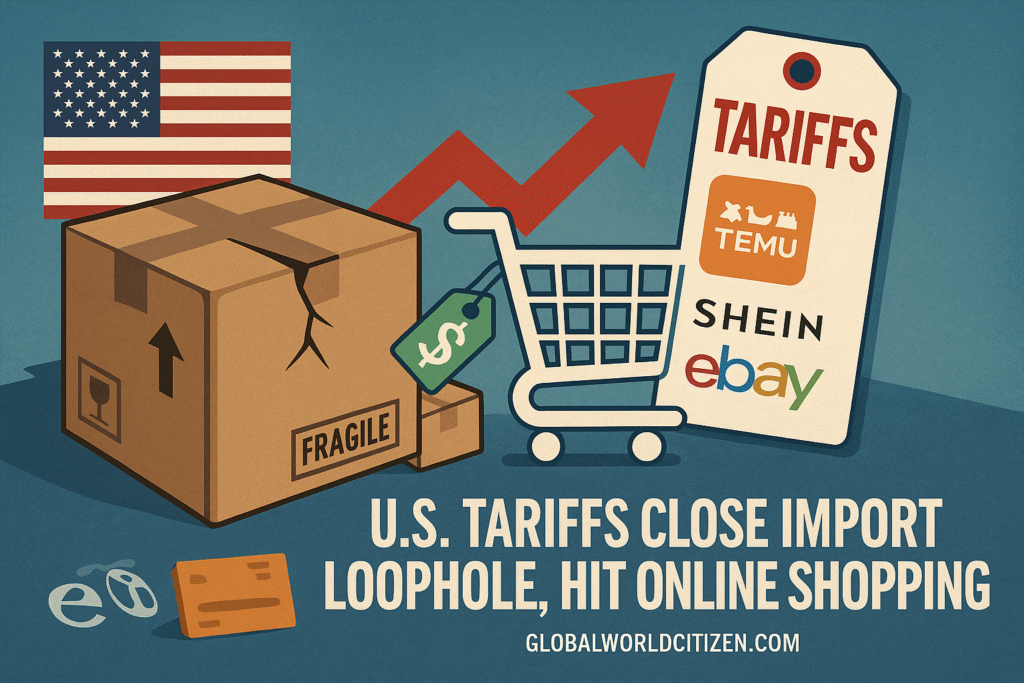Published Date: May 2, 2025 ✍️ Author: Global Trade & Consumer Economy Desk 🌐 Source: GlobalWorldCitizen.com
In a major escalation of U.S. trade policy, the de minimis tariff loophole—long used by low-cost online retailers to avoid import duties—was officially closed today, sending shockwaves through the world of global ecommerce, discount platforms, and U.S.-China trade.
The move is expected to drive up prices on platforms like Temu, Shein, eBay, and Etsy, while intensifying trade tensions with China and Hong Kong. Millions of American consumers could soon face higher costs for everything from household items to fast fashion and electronics.
 What Just Happened?
What Just Happened?
Effective early Friday, President Donald Trump’s executive order—signed April 2—eliminates the de minimis trade exemption for goods imported from China and Hong Kong.
Under the new rules:
The U.S. Postal Service can apply either a 120% tariff or a $100 flat fee on packages under $800.
Express shippers (like FedEx or DHL) may face tariffs of up to 145%.
Fees may rise to $200 per package by June, according to reporting from The Washington Post.
This marks a dramatic shift from the previous system, where retailers could ship products under $800 tariff-free, thanks to the de minimis threshold.
 What Was the De Minimis Rule?
What Was the De Minimis Rule?
The de minimis trade exemption, part of the Tariff Act of 1930, allowed companies to ship items valued under $800 to the U.S. without paying customs duties.
Originally designed for tourists and personal shoppers, the rule was expanded in 2016, opening the door for Chinese ecommerce giants to ship millions of untaxed goods daily to American homes.
A 2023 report by the House Select Committee on the Chinese Communist Party revealed that Temu and Shein alone accounted for 30% of all de minimis shipments to the U.S.
 How It Will Affect Major Platforms
How It Will Affect Major Platforms
 Temu
Temu
Temu notified customers in April that “price adjustments” were imminent due to “changes in global trade rules.” Shoppers now see import charges added to many listings.
Examples:
A $17.72 car vacuum now shows a $22.78 import fee
A $19.43 surge protector includes a $26.23 tariff charge
Temu says buyers can avoid these charges by choosing items stocked in local U.S. warehouses—though limited selection applies.
 Shein
Shein
Shein updated its pricing in late April to include tariffs in product listings, telling customers, “you will never pay extra at delivery.”
According to Bloomberg, some items saw price hikes as high as 377% following the new policy.
 Etsy
Etsy
Etsy claims that the “vast majority” of listings won’t be affected, but it is encouraging sellers to pre-pay tariffs. It’s also developing tools to notify buyers about cost changes due to import fees.
 eBay
eBay
eBay warned that packages from China and Hong Kong may incur an additional $10–$30 fee. The company pledged to help buyers and sellers navigate new duties, and offered relief for sellers on late shipment penalties.
 Amazon
Amazon
Amazon has denied plans to label products with new tariffs, though prices on its low-cost Haul platform have quietly increased since early April.
The White House condemned Amazon for allegedly considering “politicizing” the price hikes, though Amazon insists it was never officially planned.
 What Goods Are Affected Most?
What Goods Are Affected Most?
According to economists and government data, items most impacted include:
Clothing, electronics, toys, games, and furniture
Home appliances, bedding, lamps, and sports equipment
Textile imports, for which China remains the top global exporter
The flood of low-cost goods from Chinese sellers using de minimis allowed them to undercut U.S. businesses, especially in fashion and consumer electronics.
 Why Was This Rule Closed?
Why Was This Rule Closed?
Both the Trump and Biden administrations have criticized the loophole, citing:
Threats to U.S. retailers and manufacturers
National security concerns, including fentanyl smuggling
Tax evasion and unfair market practices
The AFL-CIO, Forever 21, and other industry groups lobbied for years to end it. Trump’s executive order came after pressure from trade unions and domestic business coalitions.
“It’s a big scam against American small businesses,” said Trump during a recent Cabinet meeting. “We put an end to it.”
 GlobalWorldCitizen.com Insight: A New Era of Online Trade Begins
GlobalWorldCitizen.com Insight: A New Era of Online Trade Begins
This policy marks a significant turning point in U.S.–China trade, ecommerce regulation, and the consumer retail landscape. The days of untaxed $3 gadgets and $5 dresses shipped from China may be ending.
Key Takeaways for Global World Citizens:
Expect price hikes on fast fashion, gadgets, and home goods
Watch for retailers shifting inventory to U.S. warehouses
Prepare for a reset in global ecommerce pricing structures
The closure of de minimis is not just a trade policy—it’s a restructuring of how Americans shop, how platforms price, and how global commerce will evolve in 2025 and beyond.

